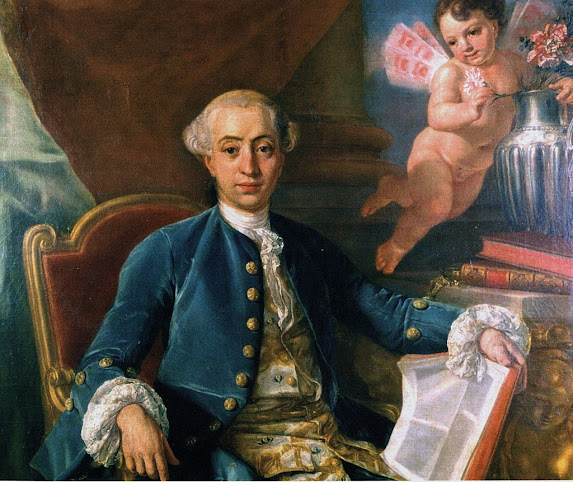Casanova in Warsaw
#Warsaw tour guide #Warsaw city guide # guided tour in warsaw #Warszawa tour guide #Warszawa city guide #guided tour in Warszawa
1765 – 1766. From Giacomo Casanova’s “The Story of My Life”, Volume 10.
Casanova in Warsaw 1765 after a visit to Russia
After a visit to Russia, Casanova travelled to Warsaw at the end of 1765, where he had recommendations for King Poniatowski, presumably from the king’s former mistress, Catherine the Great. Compared to his normal outgoing lifestyle, the now mature forty-year-old Casanova lived a relatively quiet life in Warsaw, but was nevertheless involved in a duel with a high-ranking nobleman who was close to the king. As a result, Casanova was forced to forget his plans about a job as secretary to King Poniatowski and was also asked in direct terms to leave Poland.
A vibrant city with dance and gambling
Casanova arrived in Warsaw at a time when the city had 30,000 inhabitants. In addition to being the administrative centre of the great Polish Empire, the city was a craft and industrial city with numerous breweries, mills and brickworks. It was also the beginning of the period when manufactures emerged, producing weapons, textiles and carriages, among other things. Crucially for the city, it has just changed from a place where the Saxon kings (two German kings in personal union with Poland 1733-1763) occasionally spent time, to a true capital and royal city under the new national Polish king. Casanova’s account is interesting because he, of all people, travelled the European continent and European cities during this period and can thus provide a credible description of Warsaw in comparison to other European capitals.

Giacomo Casanova, portrait: Anton Raphael Mengs, 1760
Casanova liked to gamble, but he was in Warsaw to get a job
Casanova first went to an acquaintance who ran a successful dance school, and this acquaintance informed Casanova of the extensive gambling going on in the city, organised by people he knew well. It should be noted here that Casanova himself was a passionate player who, if necessary (when he was broke), managed to cheat. But he was in Warsaw to get a job, so he lived relatively calmly.
Lack of paving made it difficult to move around
Casanova also mentions that he had to hire a carriage as it was impossible to move on foot in Warsaw. He doesn’t specify the reason for not being able to move on foot, but it could be due to the lack of paving of the streets, which would have caused the elegant clothes he undoubtedly wore to become soiled.
The Russians are in power
Poniatowski had been king for a few years, and there is no hiding the fact that it was Russia and Tsarina Catherine – represented by the Russian envoy – who held the real power in Poland. Casanova writes:
“At dinner time I went to the Paladin’s (the Russian governor’s) and found three tables, at each of which were places for thirty, and this was the usual number entertained by the prince. The luxury of the court paled before that of the Paladin’s house.” But Casanova also caught wind of the conspiracies in the city that sought to get rid of Russian domination.
Italian actresses would have tempted Casanova
Casanova undoubtedly saw Warsaw from the best circles, and he describes it as a beautiful and bright city, but especially when partying: “Warsaw was a glorious city in the carnival era” – he writes. All in all, Casanova leaves an impression of a city in full swing, both in terms of partying, art and literary discussions. He is also a frequent visitor to the recently built public theatre, where Italian actresses play the lead roles.
Making jokes about the rank system in Poland
In general, Casanova seems to be poking fun at the complicated rank system in Warsaw, at least he is careful to list the titles of each courtier, which is unusual compared to the rest of the memoir. Casanova was not a snob.
Casanova want’s to fight
Duelling was forbidden in Warsaw itself, but he still managed to get himself into a problematic affair (with a woman at the centre), and Casanova is not one to let an insult pass. His ticket to his opponent is a masterpiece of diplomatic language:
“My Lord. Yesterday evening your Excellency insulted me with a light heart, without me having given you any cause or reason for doing so. This seems to indicate that you hate me, and would gladly efface me from the land of the living. I both can and will oblige you in this matter. Be kind enough, therefore, to drive me in your carriage to a place where my death will not subject your lordship to the vengeance of the law, in case you obtain the victory, and where I shall enjoy the same advantage, if God give me grace to kill your lordship. I should not make this proposal unless I believe your lordship to be of a noble disposition. I have the honour to be your Excellency, your lordships’ most reverent and obedient servant. Casanova.“
Casanova is asked to leave Warsaw
Nothing serious happened to Casanova during the duel, but his opponent – Branicki – was badly injured. The king reacted with regret to the duel, which he perceived as a circumvention of the rules. Casanova was told to leave the city and received a considerable amount of money from the king to pay off his debts. However, Poland remained in Casanova’s consciousness, he later wrote The History of Poland, which unfortunately I have not managed to find in a language I know, and he condemned the first partition of Poland in 1772. He has correctly diagnosed Poland’s weak political situation with a weak royal power (central power) and advocates that only a strengthened state power will be able to save Poland.
Please send an email to m@hardenfelt.pl if you would like an English-speaking tour guide to show you the most important places in Warsaw.

